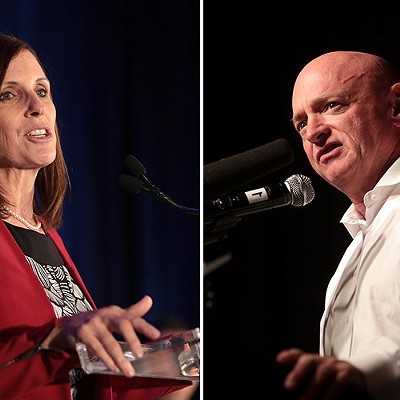According to many capitol watchdogs, next year may not be much better--unless voters oust lawmakers responsible for the ecological mayhem.
Not missing a beat, conservation groups were quick to point out the past session's many stinkers. The Sierra Club issued its regular report card on legislators who pushed for environmental protection, and those who either ignored hot-button issues, or favored quick business profits over long-term protection. And the Arizona League of Conservation Voters (ALEV) highlighted one measure protesting President Clinton's lame-duck habit of creating national monuments in the west.
Co-sponsored by Speaker Jeff Groscost, it denounced the recent establishment of two new monuments in Arizona--the Agua Fria and Grand Canyon-Parashant--calling the designations heavy-handed, and claiming that they punished private property owners in the affected areas.
The measure is merely symbolic, and apparently no one in Washington is paying much attention: on May 31, Interior Secretary Bruce Babbitt requested that Clinton designate yet another monument, this one to preserve an ironwood forest on Tucson's northwest side.
Both the Sierra Club and ALCV cited recent polls showing that some 70 percent of Arizonans favored the designations. "Most people think it's great," says Bob Beatson, League executive director. "It's only the legislature that's saying 'This is bad, everything about (the monuments) is bad.' "
Other environment-related measures coming out of the past session were likewise pandering to monied business interests, or just downright irresponsible. When called to explain their votes, many legislators were conveniently unavailable, among them Sen. Keith Bee of Tucson and Rep. Bill McGibbon of Green Valley.
Both garnered a score of "F" from the Sierra Club, as did Gov. Jane Hull. "There's been zero leadership out of her office on environmental protection," says Sandy Bahr, the Sierra Club's conservation outreach director. "Everything she's done has been contrary to what the public says it wants as far as environmental protection, and contrary even to what people on her own commissions have said they wanted."
Hull spokeswoman Francie Noyes didn't return a call from the Tucson Weekly.
While Bee co-sponsored a bill that would reduce the level of recycled content in newspaper print, and McGibbon co-sponsored a measure making it more difficult for the Arizona Department of Environmental Quality to enforce clean water standards, they and other lawmakers received the largest negative numbers for supporting the Growing Smarter Plus program. It's a pleasantly packaged measure with a duplicitous underbelly. First, the Growing Smarter Plus bill would require communities to create general growth plans, but contains many provisions and powers that communities already enjoy, along with plenty of loopholes.
Another aspect of Growing Smarter Plus is a proposed constitutional amendment, to be presented on the November ballot, that would let voters decide the future use of state trust land. Initially set aside by Congress, the land is earmarked to benefit public education. Although Growing Smarter Plus would set aside state trust lands for preservation, it caps the total acreage at a mere 3 percent of the state's holdings. The Sierra Club and ALCV argue that the percentage is far too small, and includes land least likely to be developed in the first place.
Over all, the environmentalists view Growing Smarter Plus as a thinly veiled attempt to confuse voters, who could instead pick the Citizens' Growth Management Initiative. Sponsored by the Sierra Club and other groups, the latter would provide stiffer criteria for managing urban sprawl, such as establishing growth boundaries for Arizona cities.
The legislature's Wildlife Conservation Management resolution will also be on this fall's ballot. Commonly referred to as the "super-majority bill," it would require that any future wildlife initiatives pass by a two-thirds vote of the public, considered by many to be a nearly impossible hurdle to overcome. The resolution was sponsored by Glendale Sen. Scott Bungaard, who didn't return calls from The Weekly.
Then comes the block grant Endangered Species Act, which the Sierra Club calls "an anti-Endangered Species Act manifesto." Specially, Bahr says the measure "contains inaccurate comments about critical habitat designation, and how that designation affects public and private lands. The measure claims that the Endangered Species Act has restricted the use (of public and private lands) in Arizona. There were a number of statements in there that were, one, incorrect, and two, real slams at the Endangered Species Act."
Sponsored by Sen. Herb Guenther of Tacna, the bill failed to pass. Guenther was unavailable for comment.
Other Tucson representatives receiving failing scores from the Sierra Club were Lou-Ann Preble, Steve Huffman and Dan Schottel. The only Tucson senator receiving an "F" was Keith Bee. On the flipside, senators George Cunningham and Elaine Richardson both ranked an "A" for their pro-environment performances.
In particular, Richardson calls the wildlife initiative "a stinker-and-a-half. Proponents of the super-majority are changing the initiative process," she says. "They went and hired high-powered attorneys and said 'Okay, forget the will of the people. We'll go to the legislature, and say sure, a wildlife initiative can go on the ballot, but it will need a two-thirds voter approval to pass.' Now, what are the chances of getting anything to pass by two-thirds?"
She says if lawmakers want to change the initiative process, "then change it for every issue. Don't change it just for one issue. What (super-majority proponents) have done is the most onerous thing I have ever seen for the people of Arizona."
The measure grew out of fear within the ranching lobby that 1994's successful trapping ban initiative might be repeated, she says. "You've got rural senators such as Gus Arzberger, Jack Brown, Herb Guenther, you know, those types of people who are the old-thinking rural Democrats representing ranching interests," says Richardson. "And then you've got all the Republicans, and you know, they walk like sheep since they're the majority party."
In particular, she blames Senate Majority Leader Rusty Bowers for spearheading many of the anti-environmental measures. The Mesa Republican (who earned an "F" from the Sierra Club) chairs a three-member environmental subcommittee, through which all related legislation must pass. Richardson sits on that subcommittee, along with Bowers and Mesa Republican David Petersen.
For his part, it appears that Petersen is little more than a toady for Bowers: When The Weekly attempted to contact him for comment, his secretary said "Senator Petersen chooses not to comment on environmental issues. It is not his area." Instead, she referred the reporter to Bowers.
All of which leaves Richardson in a parliamentary pickle, she says. "Rusty Bowers is a huge proponent of anything that ranchers want. And he now controls Arizona's environment through this committee that he himself created."
Indeed, Bowers shepherded Growing Smarter Plus and the super-majority measure through the Senate. He also co-sponsored a bill to remove many streambeds from state protection, which Gov. Hull allowed to become law without her signature. But he denies Richardson's allegations that he wields inordinate control, and squashes all legislation that doesn't fit his narrow agenda. "That's absolutely false," he says. "I can't even remember a single bill that she brought that I didn't hear. Elaine gets more than her fair share out of me."
Bowers says Petersen sits on the environmental subcommittee "simply because I need another body." And he's quick to dismiss his lousy Sierra Club ranking. "They've always given me an 'F'," he says. "They get to choose the bills, they get to give the weight to each bill, they get to set all the criteria. They've selected me year after year to hammer me. I say, when they get the bully pulpit, that doesn't mean they're not bullies."












